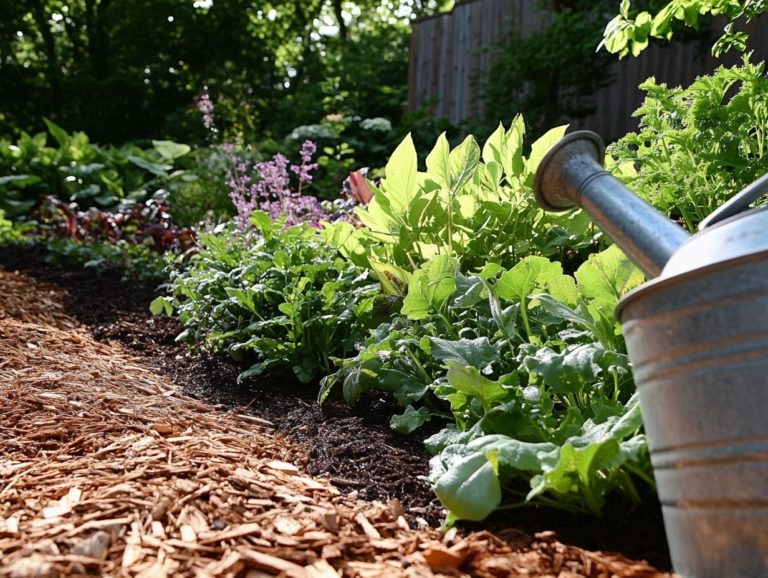Can I Use Organic Fertilizers in Permaculture?
Permaculture is not merely a gardening technique; it’s a comprehensive approach to sustainable living that aligns beautifully with the rhythms of nature. As more individuals adopt this philosophy, it becomes crucial for you to understand how organic fertilizers seamlessly integrate into the bigger picture. This article delves into the principles of permaculture, the pivotal role of organic fertilizers, and the multitude of benefits they offer. From enhancing soil health to reducing environmental impact, you’ll discover various types of organic fertilizers and practical methods to incorporate them into your permaculture practices. We will also talk about common challenges and their solutions, ensuring you are well-prepared for your sustainable journey. Jump in now to transform your gardening experience!
Contents
- Key Takeaways:
- Understanding Permaculture and Organic Fertilizers
- The Benefits of Using Organic Fertilizers in Permaculture
- Explore Different Types of Organic Fertilizers!
- How to Incorporate Organic Fertilizers into Permaculture Practices
- Potential Challenges and Solutions
- Frequently Asked Questions
- Can I Use Organic Fertilizers in Permaculture?
- What are the Benefits of Using Organic Fertilizers in Permaculture?
- What are Some Examples of Organic Fertilizers I Can Use in Permaculture?
- Are There Any Disadvantages to Using Organic Fertilizers in Permaculture?
- Can I Make My Own Organic Fertilizer for Permaculture?
- Are There Any Organic Fertilizers That Should Be Avoided in Permaculture?
Key Takeaways:
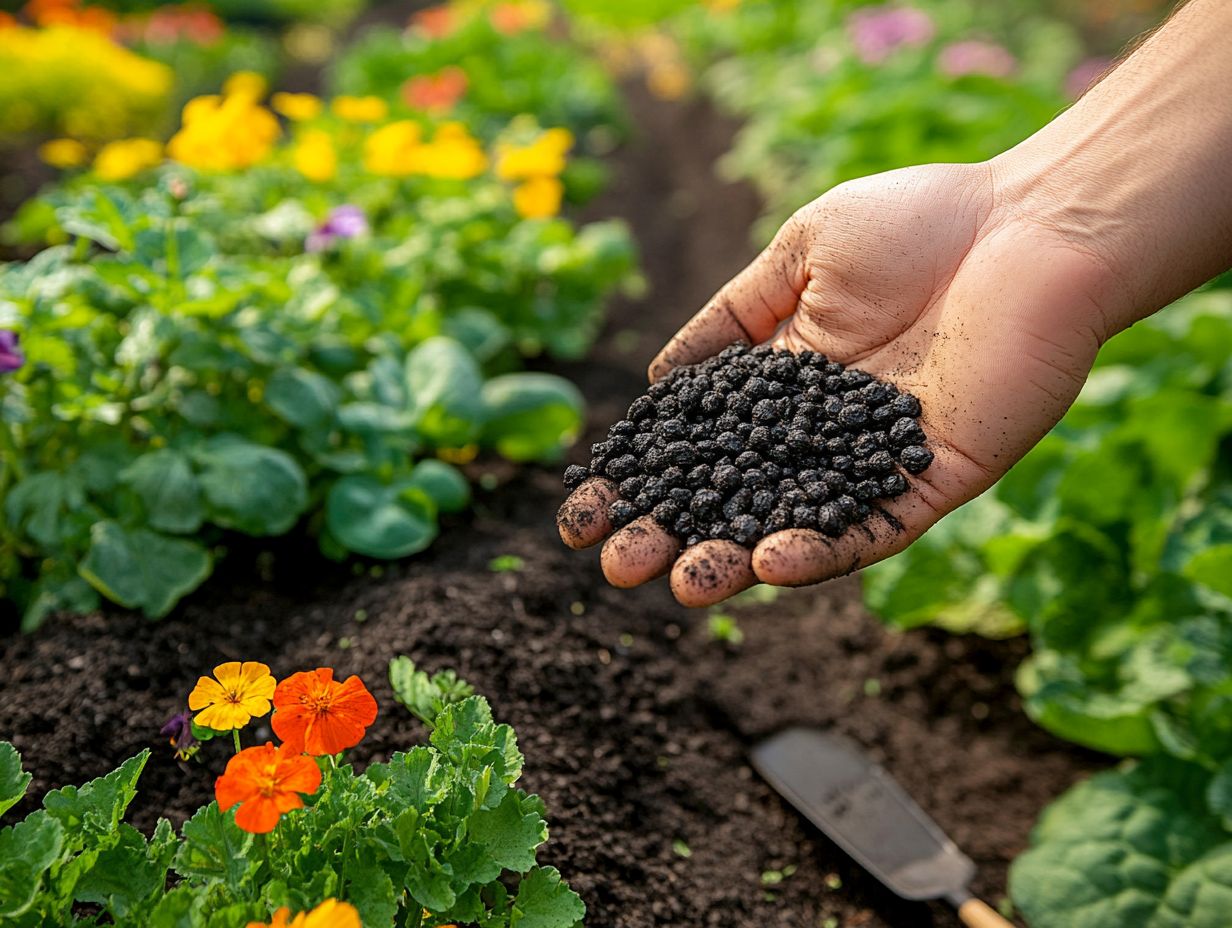
Here are the key benefits of using organic fertilizers in permaculture:
- Using organic fertilizers in permaculture practices has several benefits, including reducing environmental impact and improving soil health and nutrient retention.
- There are three main types of organic fertilizers: animal-based, plant-based, and mineral-based. Each type has its own unique benefits and uses.
- When incorporating organic fertilizers into permaculture practices, it is important to consider application methods and the specific needs of different types of plants. You may face challenges like pests and nutrient imbalances that can be managed with proper planning and techniques.
Understanding Permaculture and Organic Fertilizers
Grasping the relationship between permaculture and organic fertilizers is essential for cultivating an eco-friendly gardening environment that promotes soil health, boosts microbial activity, and optimizes how plants take in nutrients for thriving plants. Permaculture embodies a holistic approach to land management, striving to create sustainable ecosystems where organic fertilizers are critical in improving soil health, ultimately enhancing plant growth and vitality.
By implementing effective ways to turn waste into nutrient-rich soil alongside natural products, you ensure a nutrient balance that supports the entire garden ecosystem, making it resilient and productive throughout the growing seasons.
Defining Permaculture and its Principles
Permaculture is your gateway to a design philosophy that nurtures sustainable and self-sufficient agricultural ecosystems, all while mirroring the intricate workings of natural systems. As you observe nature closely and delve into the interconnected relationships within ecosystems, you can craft systems that not only thrive but also enrich the surrounding environment. This intentional approach invites you to collaborate with local climate and soil conditions, all while championing biodiversity.
By embracing eco-friendly practices like organic gardening and companion planting, you have the power to foster a flourishing habitat that nurtures native wildlife and beneficial insects. Integrating these core principles allows you to create resilient landscapes that are both productive and sustainable, ultimately playing a vital role in cultivating a healthier planet.
What are Organic Fertilizers?
Organic fertilizers come from natural sources and are specifically crafted to enrich your soil with essential plant nutrients, enhancing its quality and promoting robust plant growth. Among the most popular options you might consider are compost tea, fish emulsion, and seaweed fertilizers, each offering distinct benefits to your garden ecosystem. Think of compost tea as liquid gold; it delivers a nutrient-rich boost that supports the vital microbial life in your soil. Fish emulsion, packed with nitrogen and essential fatty acids, not only encourages lush foliage growth but also enhances the overall structure of your soil. On the other hand, seaweed fertilizers are a treasure trove of trace minerals, fostering resilience in your plants and improving nutrient uptake.
Opting for these natural alternatives over synthetic options is essential, as it not only enriches your soil but also cultivates a healthier environment for both your plants and the beneficial organisms that thrive alongside them.
The Benefits of Using Organic Fertilizers in Permaculture
Integrating organic fertilizers into your permaculture practices presents a wealth of benefits. You ll notice a significant improvement in your garden’s health, along with enhanced soil health and substantial improvements in nutrient retention.
Environmental Impact
Utilizing organic fertilizers in your gardening practices significantly reduces your environmental impact compared to conventional fertilizers, promoting eco-friendly gardening methods.
This change minimizes the chemical runoff that can harm local waterways and wildlife. It also enhances the overall health of your soil ecosystem. When you choose organic options, you encourage a diverse array of microorganisms and beneficial insects to thrive, playing a crucial role in maintaining nature s balance.
Minimizing synthetic inputs supports a sustainable approach that aligns with environmental conservation efforts. This ensures that future generations can enjoy clean air, healthy soils, and vibrant habitats. Embracing organic fertilizers is a significant step towards creating a more resilient and biodiverse gardening practice.
Soil Health and Nutrient Retention
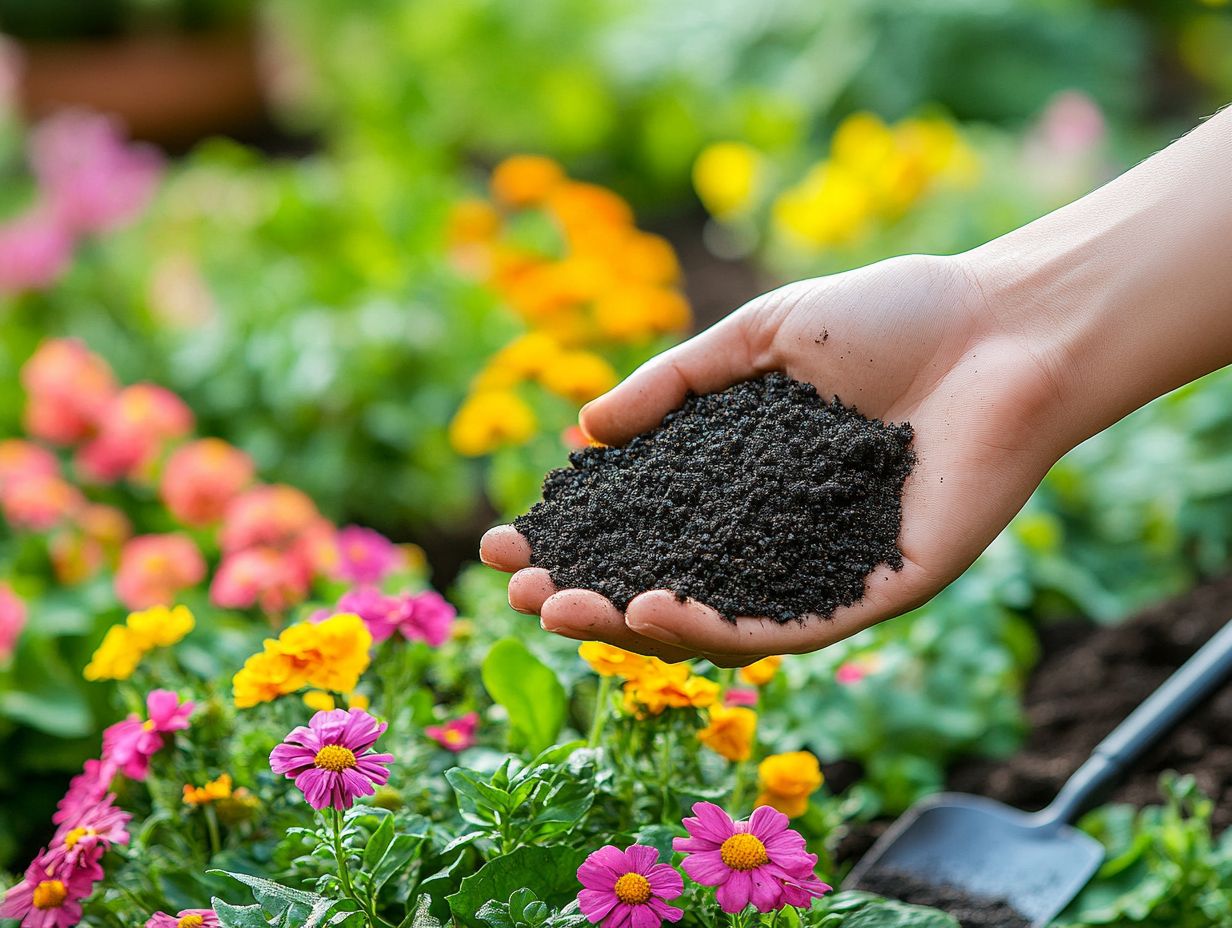
The application of organic fertilizers dramatically enhances soil health. It boosts nutrient retention and encourages beneficial microbial activity.
When you use these fertilizers consistently, you’ll notice a remarkable improvement in soil structure. This promotes better air circulation and enhances drainage, leading to increased water retention capabilities that allow your plants to access moisture more efficiently during dry spells.
Incorporating well-balanced compost introduces essential nutrients and stimulates the growth of beneficial microorganisms. These tiny allies work together to break down organic matter and release vital nutrients into the soil.
As a result, you ll see healthier plants emerge, showing greater resilience against pests and diseases. This truly highlights the transformative power of organic practices in sustainable agriculture.
Explore Different Types of Organic Fertilizers!
Organic fertilizers can be classified into three primary categories: animal-based, plant-based, and mineral-based fertilizers. Each type provides distinct advantages that contribute to improving soil quality and promoting healthy plant growth.
Animal-based Fertilizers
Animal-based fertilizers, such as blood meal, bone meal, and feather meal, are packed with nutrients that significantly enhance soil fertility.
These organic amendments provide vital macronutrients essential nutrients that plants need in large amounts, like nitrogen, phosphorus, and potassium that are crucial for the vigorous growth of your plants. By integrating these fertilizers into your soil, you can improve its structure, which boosts water retention and aeration, ultimately fostering healthier root development.
The slow-release characteristics of these fertilizers ensure a consistent supply of nutrients over time. This minimizes the risk of leaching and nutrient runoff. Their application not only promotes robust plant growth but also aligns with a sustainable approach to farming and gardening, enriching the ecosystem as a whole.
Plant-based Fertilizers
Plant-based fertilizers, such as compost tea, seaweed fertilizers, and alfalfa meal, are exceptional sources of organic nutrients that can elevate your plants’ development to new heights. These natural alternatives deliver essential minerals and enhance soil structure while fostering biodiversity.
Take compost tea, for example. It s brimming with beneficial microorganisms that replenish nutrient stores and cultivate a thriving ecosystem within your soil. Seaweed fertilizers, on the other hand, are a powerhouse of trace elements and growth hormones that invigorate root health and overall plant vitality. And let s not overlook alfalfa meal, derived from leguminous plants it s a fantastic nitrogen source that stimulates the production of beneficial enzymes.
By embracing effective composting practices, you can create your own nutrient-rich fertilizers, minimizing waste and enriching your soil health while nurturing your plants to flourish beautifully. Are you ready to transform your gardening with organic fertilizers? Start now to reap the benefits!
Mineral-based Fertilizers
Mineral-based fertilizers, such as Epsom salt and crustacean shell, are game-changers for your garden’s health! They provide the trace minerals that enrich nutrient balance in your soil.
These fertilizers promote plant health by offering a spectrum of vital nutrients, including magnesium, calcium, and small nutrients that plants need in tiny amounts. For example, Epsom salt is renowned for its ability to boost seed germination and enhance photosynthesis. Crustacean shells serve as a slow-release source of calcium and chitin, strengthening cell walls and increasing pest resistance.
Start using these mineral-rich fertilizers today to see your garden thrive! By incorporating these amendments into your gardening routine, you nourish your plants, improve soil structure, and foster microbial activity. They are critical allies for anyone seeking to cultivate flourishing crops.
How to Incorporate Organic Fertilizers into Permaculture Practices
Incorporating organic fertilizers into your permaculture practices involves a careful understanding of various application methods. This knowledge is essential for optimizing soil health and promoting robust plant growth, while maintaining the principles of sustainable gardening through the use of natural fertilizers.
Application Methods
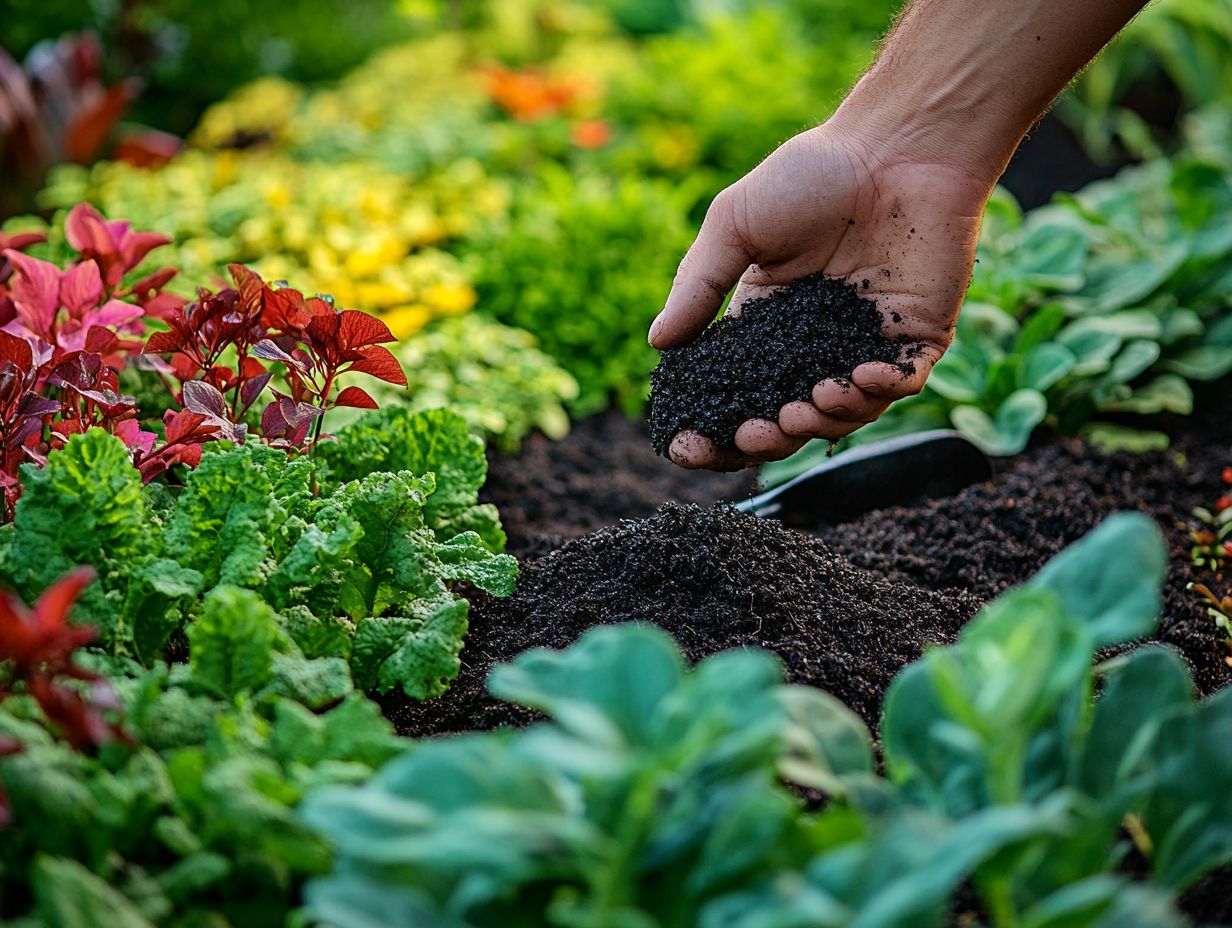
There are several effective methods for applying organic fertilizers, including foliar sprays, compost tea, and fish emulsion. These methods are designed to maximize nutrient uptake by your plants.
Each method brings its own set of advantages that can greatly influence the health and growth of your greenery. For example, foliar sprays enable rapid nutrient absorption through the leaves, delivering essential elements directly to the plant s physiological systems. This approach is particularly beneficial during periods of vigorous growth or stress.
Compost tea serves as a slow-release nutrient source, fostering beneficial microbial activity in the soil and enhancing its overall health. To optimize absorption rates, it’s best to apply these methods during the cooler parts of the day and avoid application before heavy rain to prevent nutrient runoff.
Considerations for Different Types of Plants
Different types of plants have unique nutrient requirements, making it essential to consider these needs when applying organic fertilizers for optimal vegetable growth.
For instance, leafy greens often thrive with higher nitrogen levels. In contrast, flowering plants benefit from a balanced approach that includes phosphorus and potassium to support their blooming. Understanding these specific needs allows you to tailor your fertilizer applications, ensuring each plant receives the proper nourishment.
Maintaining a nutrient balance is crucial; deficiencies can inhibit growth and promote disease, while an excess may harm soil health. By thoughtfully applying fertilizers according to the individual requirements of your plants, you create a thriving garden ecosystem that flourishes throughout the growing season.
Potential Challenges and Solutions
Organic gardening practices bring a multitude of benefits, yet they also come with their share of challenges, especially when managing pests, weeds, and nutrient imbalances.
To overcome these challenges, stay informed and proactive in your gardening approach. Engage with fellow gardeners and share your experiences to foster a supportive gardening community.
Start your journey with organic fertilizers today and watch your garden thrive!
Dealing with Pests and Weeds
Managing pests and weeds in your organic garden involves strategic approaches that align seamlessly with eco-friendly practices. This includes utilizing natural products and helpful tiny organisms in the soil.
Exploring a range of organic pest control methods is crucial for ensuring your plants thrive in a healthy environment. You can introduce predatory insects that naturally keep pest populations in check or employ companion planting to form natural barriers against unwanted visitors. These methods enhance the overall vitality of your plants.
Effective weed management techniques are equally important. For instance, mulching not only suppresses weed growth but also enriches your soil, creating a thriving habitat for your plants.
Don’t underestimate the power of beneficial microorganisms like mycorrhizal fungi, nitrogen-fixing bacteria, and earthworms. They play a vital role in enhancing soil health and promoting plant growth by improving nutrient uptake.
When you combine these strategies, you cultivate a harmonious garden ecosystem that minimizes reliance on synthetic chemicals. This fosters a sustainable and flourishing environment.
Managing Nutrient Imbalances
Managing nutrient imbalances is essential in organic gardening for achieving optimal plant growth and cultivating a thriving soil ecosystem with the help of soil amendments. These imbalances can occur for various reasons, such as soil tests revealing either deficiencies or excesses of essential nutrients.
Nitrogen plays a crucial role in promoting leafy growth. Phosphorus is key for root development and flowering, while potassium enhances overall plant health and resilience. Understanding how these elements interact empowers you to make informed amendments.
Regular monitoring and strategic use of organic fertilizers can significantly help in correcting these deficiencies. By incorporating compost and practicing crop rotation, you can quickly restore balance and watch your garden thrive!
Frequently Asked Questions
Can I Use Organic Fertilizers in Permaculture?
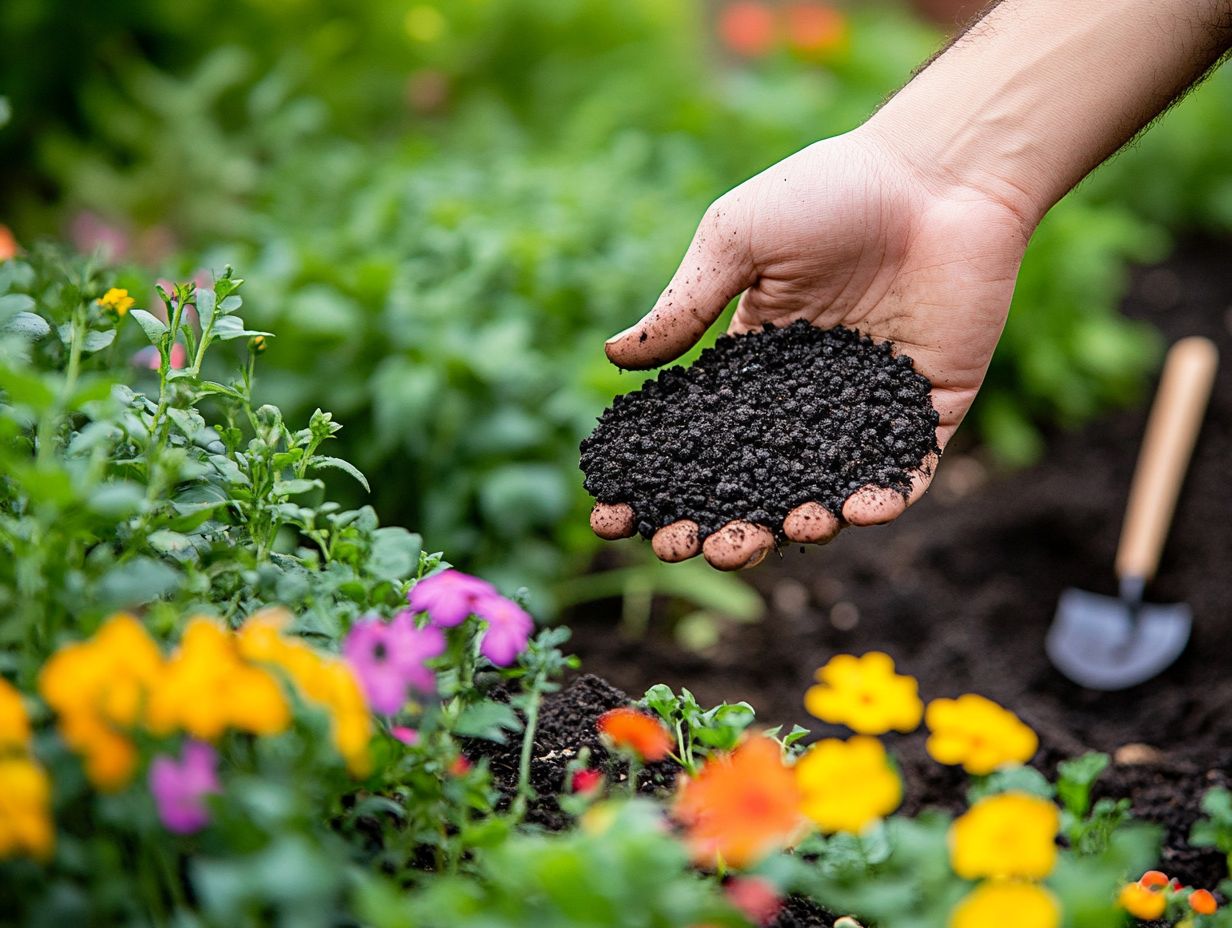
Yes, organic fertilizers are an important component of permaculture as they provide essential nutrients to the soil in a sustainable way.
What are the Benefits of Using Organic Fertilizers in Permaculture?
Organic fertilizers not only provide nutrients to the soil, but they also improve soil structure, increase microbial activity, and promote a healthy ecosystem for plants to thrive.
What are Some Examples of Organic Fertilizers I Can Use in Permaculture?
Some examples of organic fertilizers commonly used in permaculture include compost, manure, seaweed, bone meal, and fish emulsion.
Are There Any Disadvantages to Using Organic Fertilizers in Permaculture?
While organic fertilizers have many benefits, they can take longer to break down and release nutrients compared to synthetic fertilizers. This means it may take longer to see results in plant growth.
Can I Make My Own Organic Fertilizer for Permaculture?
Yes, you can easily make your own organic fertilizer by composting kitchen scraps and yard waste or by creating a compost tea using organic matter and water.
Are There Any Organic Fertilizers That Should Be Avoided in Permaculture?
It is best to avoid using any chemical-based fertilizers in permaculture as they can harm the environment and disrupt the natural balance of soil and plant life. Stick to using organic fertilizers like crustacean shell and feather meal for a more sustainable approach.





